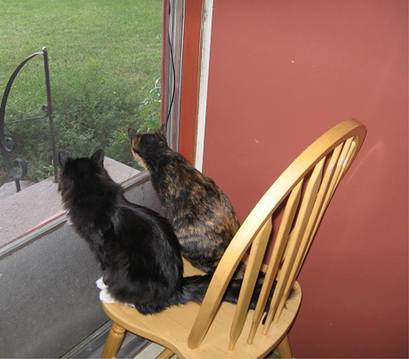caring for your senior cat
 In just a few short weeks, my two cats, Murphy and Bailey, will turn 12 years of age. They are sisters, even though they look nothing alike. My husband and I adopted them when they were about 10 weeks old, being born of a feral mother who allowed herself to be taken into a friend’s home a few days prior to giving birth; it was like Mamma knew she needed to be somewhere safe to protect her newborns. Everyone received a new home, and on August 1, our two girls will become even more “senior” at the ripe age of 12.
In just a few short weeks, my two cats, Murphy and Bailey, will turn 12 years of age. They are sisters, even though they look nothing alike. My husband and I adopted them when they were about 10 weeks old, being born of a feral mother who allowed herself to be taken into a friend’s home a few days prior to giving birth; it was like Mamma knew she needed to be somewhere safe to protect her newborns. Everyone received a new home, and on August 1, our two girls will become even more “senior” at the ripe age of 12.Prior to Murphy and Bailey coming into our lives, my husband and I had a long-haired orange and white cat which I brought into our marriage. This cat, Ama, was also a rescued kitty; I adopted her from the Bozeman (Montana) Humane Society in 1990, and she lived until she was more than 18 years of age.
Cats often live to middle-to-late teens, and even some to age 20 and beyond. In fact, the oldest cat known is Crème Puff, who lived to be more than 38 years of age. Senior cats require extra-care. For example, they often can’t groom themselves as well as when they were younger, especially the long-haired variety. Experts recommend frequently brushing your older cat. Thankfully, my girls were brushed while they were very young, and therefore, they are used to it and they enjoy it. In fact, they know the word “brush,” and come running when I call their names and add the word “brush.”
Other care one needs to take with senior cats include:Watch for arthritis. Until recently, not much was known about arthritis in cats, but this ailment is very common in older kitties. A glucosamine and/or Omega 3 fatty acid regiment, such as Cosequin, Glycoflex, or even a special food, can help ease the pain in felines just as it can in humans (or dogs). Talk with your veterinarian.Keep your cat at an ideal weight. Even though cats are known to sleep a lot, younger cats are more active; older cats sleep even more than when they were younger. Therefore, senior kitties often put on extra weight. Help your older cat maintain an ideal weight by engaging him/her in activities and feeding your cat an appropriate diet.Make navigation easy. If your cat has trouble jumping, consider installing lower perches, stairs, ramps to help it navigate to the window, the bed, or other of its favorite places. Even the litter box might need to be lower and easier to climb into. Mobility issues, which often occur because of arthritis, often occur in older cats.Keep your cat’s teeth healthy. Mouth diseases can lead to other health problems, so provide treats that help cats maintain healthy teeth and gums and consider brushing your cat’s teeth regularly.
Diseases common to senior kitties include renal failure, diabetes, cancer, and overactive thyroid. Many pet experts recommend twice-yearly visits to the vet since cats are good at hiding pain and can’t tell you if they’re feeling sick or where it hurts.
Caring for a senior cat can take extra time in your day, extra expense in your budget, and extra love and compassion. But, your feline friend deserves all the “extras” you provide, for s/he has provided you the companionship and devotion you longed for, whether you’ve had your cat from kittenhood, as my two girls, or adopted at an older age, as was my Ama. Each cat has blessed my life, and I’m thankful to have enjoyed so many years with each of them!
For more information on caring for senior cats, visit this website: https://www.petfinder.com/cats/cat-care/senior-cat/.

Published on July 18, 2017 05:00
No comments have been added yet.



